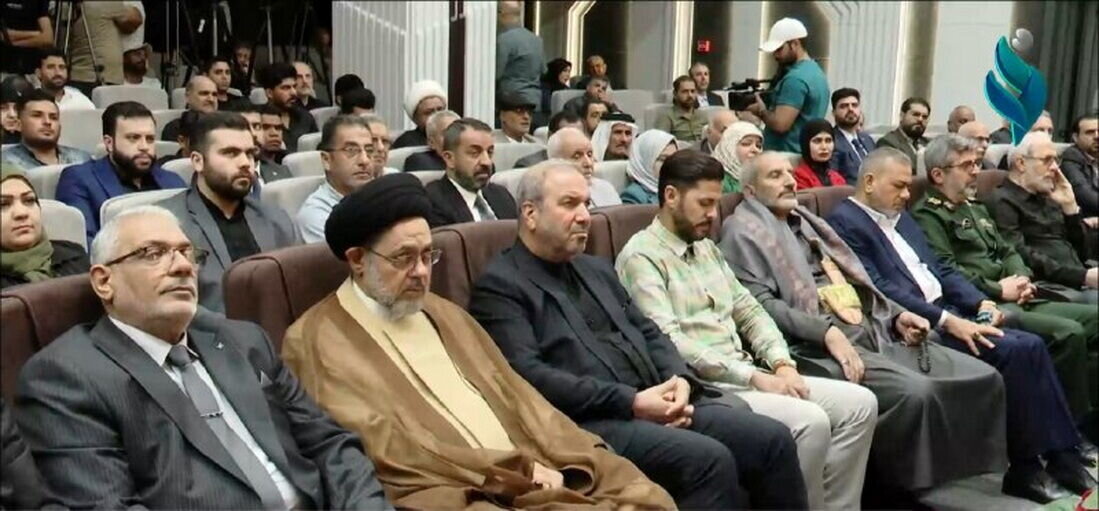Iran embassy in Baghdad holds investigative meeting on Operation True Promise

TEHRAN- The Iranian embassy in Baghdad has held a meeting to investigate the dimensions of the True Promise operation as well as Iran’s response to the aggressions of the Zionist regime. The gathering was held with the participation of certain Iraqi political groups and researchers.
The Al-Nujaba TV network reported that during the meeting the technical, scientific as well as other aspects of the operation were discussed and analyzed.
Iran’s ambassador to Baghdad, Mohammad Kazem Al-Sadegh, stated that despite the fact that the retaliatory operation had been announced in advance and the Zionist regime and its allies were all prepared, it was completely unexpected and surprising.
He also emphasized that although Israel was fully prepared for this attack and was at the peak of readiness, it suffered significant losses as a result of the operation.
Asad Al-Tamimi, Iran’s cultural attache in Baghdad, said that the program held under the name of Operation True Promise at the embassy was intended for the Iraqi brothers to become familiar with it and present their research on this operation.
He also stressed that discussions, research, and analysis of this historic event will continue.
Razi Al-Husseini, an Iraqi researcher who participated in this event, declared that the operation demonstrated the victory of the Islamic Republic.
He added that a new era has emerged that differs from the period before the operation, representing the electronic, armament, and ballistic missile capabilities of the Islamic Republic.
He concluded by saying that the operation also showed how accurately Iran’s missiles hit their designated targets.
Al-Nujaba did not mention the number or names of the participants in this event.
The armed forces of the Islamic Republic of Iran and the aerospace of the Islamic Revolution Guard Corps launched Operation True Promise on the evening of Sunday, April 13, with the launch of more than a hundred cruise and ballistic missiles and the deployment of over two hundred Shahed-136 suicide drones in response to the recent aggressions and terrorist acts of the occupier regime in attacking the Iranian consulate in Damascus.
The Israeli airstrike, which took place in Damascus’s Mezzeh district, resulted in the deaths of seven military advisors from the Islamic Revolution Guards Corps (IRGC). Iranian officials have vowed a decisive response to what they described as a violation of international obligations and conventions.
The assault drew sharp rebukes from governments and foreign ministries, citing violations of international law and diplomatic norms.
In Iran, the attack was interpreted as a declaration of war by Israel. It represented a radically different offensive compared to previous ones as it directly targeted Iranian soil, symbolized by its consulate in Syria.
From a political standpoint, it is important to highlight the numerous reactions that the attack on the consular headquarters was generating in Iran. Foreign Minister Amir Abdollahian stated that Iran sent “a message to the United States making it clear that the country [the U.S.] was considered responsible” for the attack and the killings. In this regard, Ali Shamkhani, an advisor to the Leader of the Islamic Revolution, affirmed that “whether Washington was informed beforehand about Israel's intention to carry out the attack or not, does not absolve it of direct responsibility for this crime.”
The spokesperson for the Ministry of Foreign Affairs, Nasser Kanani, deemed the attack as a blatant violation of international regulations, especially the 1961 Vienna Convention on Diplomatic Relations. Additionally, he added, “It is appropriate and necessary for this action to be condemned by the international community and the United Nations with the strongest expressions, and for necessary measures to be taken against the aggressor.”
He also emphasized that “the Islamic Republic of Iran would determine the type of response and punishment for the aggression.”
Leave a Comment